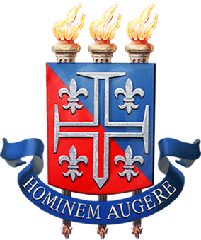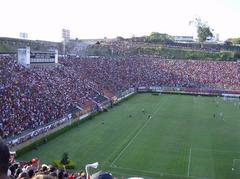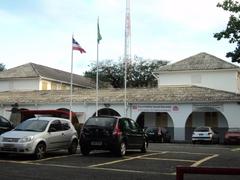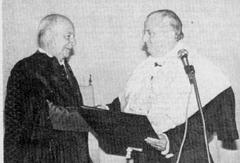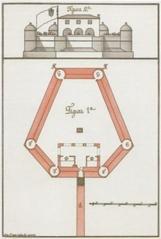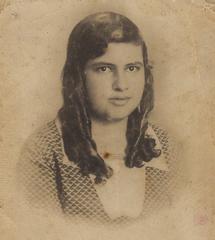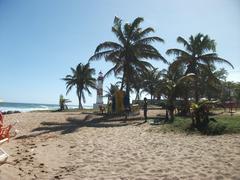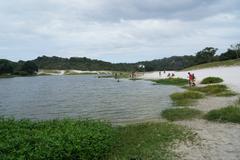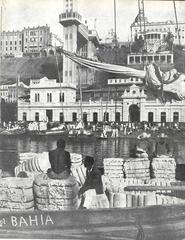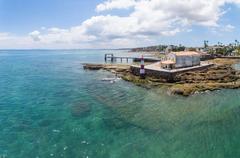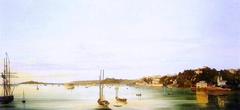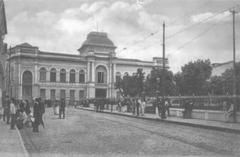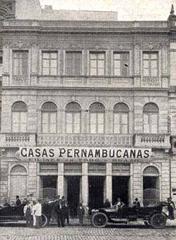Afro-Brazilian Museum Salvador: Visiting Hours, Tickets, and Travel Guide
Date: 15/06/2025
Introduction
Situated in Salvador’s historic Pelourinho district, the Afro-Brazilian Museum (Museu Afro-Brasileiro, MAFRO) is a pioneering institution dedicated to preserving, researching, and celebrating the African roots that have profoundly shaped Brazilian society and culture. Established in 1982 as the first museum in Brazil to focus exclusively on African and Afro-Brazilian heritage, MAFRO offers visitors an immersive journey through centuries of resilience, creativity, and cultural fusion.
Housed in the historic building of Brazil’s first medical school and supported by the Federal University of Bahia (UFBA), the museum bridges academic research with community engagement. Its location in Pelourinho—a UNESCO World Heritage Site and former center of the slave trade—provides a poignant backdrop, enriching the visitor experience with layers of historical significance.
This comprehensive guide covers everything you need to plan your visit: Afro-Brazilian Museum visiting hours, ticket prices, accessibility, guided tours, and nearby Salvador historical sites. It also highlights the museum’s collections, significance, and practical tips for a fulfilling visit (Museu Afro-Brasileiro, Connect Brazil, 33travels.com).
Table of Contents
- Introduction
- Historical Background and Significance
- Museum Collections and Highlights
- Visiting the Afro-Brazilian Museum
- Nearby Attractions in Pelourinho
- Visitor Tips and Practical Information
- Frequently Asked Questions (FAQ)
- Visual and Interactive Resources
- Conclusion
- Useful Links
- References
Historical Background and Significance
Founding and Institutional Context
MAFRO was inaugurated on January 7, 1982, through a partnership between the Federal University of Bahia, various government ministries, and the city of Salvador. Its establishment reflected a growing recognition of the need to celebrate and preserve the cultural contributions of African descendants in Brazil.
Guided by scholars such as Dr. Yeda Pessoa de Castro and ethnographer Pierre Verger, the museum’s mission is rooted in both academic research and community outreach. As a “museum in process,” MAFRO continues to evolve, responding to new research and the needs of Salvador’s vibrant Afro-Brazilian communities.
Salvador’s Afro-Brazilian Heritage
Salvador is often called the “creative soul of Brazil” and is home to the country’s largest population of African descendants. The city’s history—marked by the transatlantic slave trade and centuries of cultural fusion—makes it an epicenter of Afro-Brazilian identity. Pelourinho, the museum’s neighborhood, is not only a historic district but also a living center of music, religion, and resistance (Connect Brazil).
Mission and Impact
MAFRO’s objectives include:
- Documenting and preserving Afro-Brazilian heritage—both tangible and intangible.
- Promoting education and research through collaborations, lectures, and workshops.
- Celebrating the artistic, religious, and social practices of Afro-Brazilians.
- Fostering cultural pride and combating racial prejudice through education and outreach.
Through partnerships with institutions such as Casa do Benin and the Ilê Ohun Lailai Museum, and participation in cultural festivals, the museum is a leader in Afro-Brazilian advocacy and cultural diplomacy.
Museum Collections and Highlights
Thematic Galleries
- African Origins: Ethnographic artifacts from West and Central Africa, including masks, ritual objects, and textiles.
- The Middle Passage and Slavery: Documents, photographs, and objects related to the transatlantic slave trade.
- Afro-Brazilian Religions: Sacred art, ritual implements, and costumes from Candomblé and related faiths.
- Contemporary Afro-Brazilian Art: Works by artists like Nadia Taquary, blending tradition and modernity.
Key Artifacts
- Carybé Panels: 27 cedar wood panels by artist Carybé, depicting orixás (deities) of Candomblé (33travels.com).
- African Masks and Ritual Objects: From Nigeria, Benin, Angola, and more.
- Textiles and Everyday Objects: Handwoven cloths, ceremonial garments, utensils, and musical instruments.
- Artifacts from the African Diaspora: Items from Haiti, Cuba, and other diasporic communities.
- Historical Documents: Manuscripts, letters, and photographs chronicling Afro-Brazilian experiences.
- Quilombo Resistance Artifacts: Tools and personal effects symbolizing resistance and survival.
These collections invite visitors to reflect on the endurance and contributions of Afro-Brazilian communities across centuries (Atlas Obscura).
Visiting the Afro-Brazilian Museum
Location and Access
Address: Praça Terreiro de Jesus, s/n, Pelourinho, Salvador, Bahia, Brazil
Phone: +55 (71) 3283-5540
Email: [email protected]
Official Website: Museu Afro-Brasileiro
Visiting Hours
- Tuesday to Sunday: 10:00 AM – 5:00 PM
- Closed: Mondays and public holidays
- Note: Hours may vary on holidays or special events. Always check the official website before your visit.
Tickets and Admission
- General Admission: R$10 (subject to change)
- Discount: Students, seniors, and Bahia residents receive reduced rates.
- Free Entry: Wednesdays (confirm on the official website)
- Purchase: At the museum entrance or online via the official website (Next Stop Brazil)
Accessibility
- Ramps and accessible restrooms are available, though some historic areas may be less accessible.
- Multilingual resources are limited; English exhibit labels are sparse, so consider using translation apps or joining a guided tour.
Guided Tours and Interpretation
- Languages: Tours are primarily in Portuguese, with English and Spanish available upon request.
- Booking: Arrange in advance for the best experience.
- Self-Guided Options: Download the Audiala app for audio tours and additional content.
Amenities
- Restrooms (including accessible facilities)
- Cloakroom for bags
- Gift shop with books and crafts
- Free Wi-Fi in the lobby
Nearby Attractions in Pelourinho
Combine your museum visit with other notable Salvador historical sites:
- São Francisco Church and Convent: Renowned for its baroque interior (Next Stop Brazil)
- Casa do Benin: Focused on connections between Brazil and Benin
- Casa do Carnaval da Bahia: Interactive exhibits on Salvador’s Carnival (London and the World)
- Olodum Drum School: Experience live samba-reggae performances (National Geographic)
Visitor Tips and Practical Information
- Best Times to Visit: Weekday mornings for quieter visits; Wednesdays are free but may be crowded.
- Dress: Comfortable, breathable clothing; modest attire is appreciated.
- Safety: Pelourinho is generally safe and well-patrolled, but standard precautions are recommended.
- Photography: Non-flash photography is allowed in most areas; always check signage and respect the sacredness of certain exhibits.
- Language: Most staff speak Portuguese; learning basic phrases can enhance your experience.
Frequently Asked Questions (FAQ)
Q: What are the Afro-Brazilian Museum visiting hours?
A: Tuesday to Sunday, 10:00 AM – 5:00 PM; closed Mondays and public holidays.
Q: How much do tickets cost?
A: General admission is R$10, with discounts for students, seniors, and residents; free on Wednesdays.
Q: Is the museum accessible for visitors with disabilities?
A: Yes, with ramps and accessible restrooms, but some historic areas have limited access.
Q: Are guided tours available in English?
A: Yes, upon request and with advance booking.
Q: Can I take photos inside the museum?
A: Non-flash photography is generally allowed; observe posted restrictions.
Q: What other historical sites are nearby?
A: São Francisco Church, Casa do Benin, Casa do Carnaval da Bahia, and Olodum Drum School.
Visual and Interactive Resources
Enhance your experience by exploring:
- High-resolution images of artifacts, with descriptive alt tags like “Afro-Brazilian Museum African masks” or “Candomblé orixá sculptures Salvador.”
- Virtual tours and interactive maps of Pelourinho.
- Audio guides and educational content via the Audiala app.
Conclusion
The Afro-Brazilian Museum in Salvador is more than a collection of artifacts—it is a living institution honoring the enduring legacy of African culture in Brazil. Its thoughtfully curated galleries, educational programs, and community outreach make it a must-visit destination for travelers, scholars, and anyone interested in understanding Brazil’s diverse heritage.
To maximize your visit, check current hours and ticket options, consider guided tours, and participate in special events. Make use of digital resources, including the Audiala app, and explore the vibrant surroundings of Pelourinho for a complete cultural experience.
Useful Links
- Museu Afro-Brasileiro Official Website
- Salvador Tourism
- Connect Brazil
- 33Travels Guide
- WhichMuseum Salvador
- National Geographic: Salvador’s Afro-Brazilian Heritage
- Atlas Obscura: Museu Afro Brasil
References
- Museu Afro-Brasileiro
- Connect Brazil
- 33travels.com
- Next Stop Brazil
- WhichMuseum
- National Geographic
- Atlas Obscura

